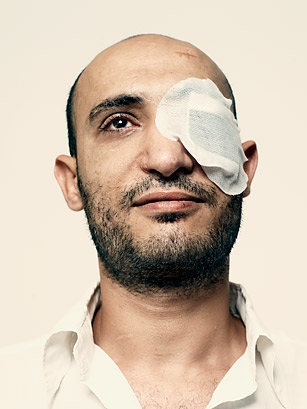
(2 of 2)
What was the most memorable moment for you?
Actually, there are two days: the 28th of January here in Egypt and the day when the Americans occupied Wall Street. Because here in Egypt we raised the slogan of social justice, and I see that Americans need it and did that too because there has to be social justice. As I told you before, absolute capitalism has to be removed. There can be capitalism, but for me as a citizen, I need to know very well that the taxes I pay are being used in education, health care and services. Health care and education cannot be privatized; it has to be offered to everyone. Same with services. All my needs have to be met as long as I'm living in a country. This is what we ask for here. It exists, but not enough money is spent on it. We need to improve it. And what I know is that in America you have to have [health insurance] to be treated — otherwise you won't be, and this is brutal and inhumane. It has to be reformed all over the world. There can't be a private company that controls electricity, transportation, water, education and health care. All this has to be available to the people. As they say in America, "The power of the people will change everything." There is nothing in the world that stands in front of the power of the people. The next best day was 15th of October. There was a socialist stand all over the world, in Cairo, Spain, Italy, America that called for socialism and social equality in about 30 countries, and I know that it will be achieved because nothing stands against power of the people.
What was the most important lesson of the revolution?
[Last winter] Huge numbers of people went to Tahrir and stayed the whole time until the army took control. They gave hope to the people that life will be good. And since we are emotional people who are naturally inclined to stability and peace, Egyptians decided to trust the army with running the country's affairs, and they went home. But about 2,000 or 3,000 stood still, and the demands kept on rising, and repression started from members of the military. I do not blame people who left because they trust the military. But it kept escalating, from 2,000 to 5,000 to 20,000 to, as you can see now, a million, because as time goes by, they see that the country is not where we want it to be. Demands aren't achieved after lots of time. And people felt there was a strange policy, like: O.K., we will have elections, and members [of the former ruling National Democratic Party] weren't supposed to run in elections, yet they did. That was the peak. Before that, when they had a referendum and fooled the people, it just kept on carrying on that way. The masses who left [Tahrir initially] saw that this is not what you [the military] promised us, so they went back [to Tahrir] again. In January Egyptians trusted the army so they left it to the military. But when they didn't see it going as they had expected, they returned.
I had a feeling [back in the early days following Mubarak's ouster] that it would stay the same, because there were already isolated incidents when [the military] were on duty: they mistreated guys, and on the 28th of June they attacked the martyrs' and wounded people's families [who were demonstrating in Tahrir.]. And, just like what's happening in Mohamed Mahmoud Street today, we had a "small war," also on Mohamed Mahmoud Street, then. I arrived at 12 a.m. and left at 1 p.m. the next day. I couldn't move at all. It was the same thing — they hit us with shotgun pellets and rubber bullets, and they were assisted by thugs carrying knives, while we were throwing stones back at them until they gave up and left. And that day I got hit by a few rubber pellets on the front line. I knew and expected that the police would stay the same because it hasn't been cleansed. The elements are still the same.
Will the revolution continue?
They [average Egyptians] see that [the military can be heavy-handed]. But there's a difference between "I want stability" and "I don't understand." They understand, but they want stability. They know that the police force has not been cleansed, and that police are very violent, but the fear of the Egyptian citizen outside the square is that a clash between civilians and the army takes place. I think that this fear is diminishing. The army to them is the army who won the war in 1973. Therefore it's impossible for the army not to have ethics. I'm talking about members of the military, and honor — this image cannot disappear to the normal citizen, but it started to change recently due to individual incidents. But as a whole the military is still strong and good and all we ask for is that the military council returns to its barracks and abandons politics and the country's affairs, to return to being an institution in the country. As protesters, we want that.